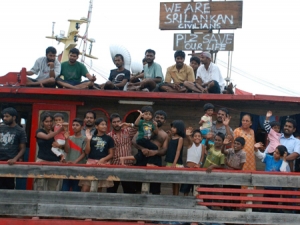Ilankai Tamil Sangam30th Year on the Web Association of Tamils of Sri Lanka in the USA |
|||
 Home Home Archives Archives |
Ship-bound Tamil Refugees Need Helpby Joe Fiorito, The Toronto Star, March 11, 2010
They are Tamils. Five months on a boat meant for 50. You can imagine. No, you can’t. Some of them are from camps in Malaysia. All of them fled the recent war. The Indonesian government is doing nothing to help. Why should that matter to us? Nearly half of the people on that ship have relatives in Canada. Here’s another reason. A woman from Toronto went to see the boat recently. Jessica Chandrashekar is a PhD student at York University. She is 26 years old, and she is a member of a small non-governmental organization, Canadian HART. The acronym is short for the Humanitarian Appeal for the Relief of Tamils. Jessica told her story at a small, almost impromptu meeting recently. She said, “We didn’t get to see the boat for very long. We were there for five minutes. The police detained us. They interrogated us for 11 hours the first day. They took our passports. The second day they interrogated us for seven hours. They asked us who we were, and who sent us, and they asked if we have family on the boat.” I could have told them who she is. She is a student at York. “The third day, they took us to the airport and deported us.” Was she afraid? “I was concerned. We could have been arrested. After hearing the stories of the people on the boat ...” Wait a minute. If she was detained, and if the men and women on the boat can’t come ashore, how was she able to hear their stories? “They have a laptop and a camera, and they have Skype. They send pictures.” I love the Internet. “There are 31 children on board. The youngest is 1 year old, and learned to walk on the ship.” That child was born in a bunker in Sri Lanka, during the shelling; somehow, the mother made her way with her infant to a camp in Malaysia. There is another woman on board who was due to give birth last week. What would we do if that ship were anchored off Ward’s Island? Yes, I know — the boat is not here. But it is, in a way, here by proxy: if your nephew was about to be born on board, and so on. Jessica said, “We’re afraid of what might happen if they try to come off the boat. They will be beaten, detained — Indonesia hasn’t signed on to the United Nations High Commissioner for Refugees.” What now? Jessica said, “We’re trying to negotiate guarantees ... for freedom of movement, for medical care.” What about those who say the people on board are terrorists? Jessica said, “There are UNHCR procedures ... these people are refugees, they are fleeing persecution ... we have to honour their evidence.” Present at the meeting were representatives of a couple of groups that help refugees; there was information passed around for the benefit of those who might have family on board, and further information about refugee sponsorship. I asked Jessica again if she hadn’t been afraid. She said, “When I look back, maybe I’ll think, ‘Oh, my God.’ But really, I was only at risk of being deported back to Canada, where I live comfortably, I eat well, I go to school; if the people on board were deported, it would be different.” If there were more like her, it would be different, and better. |
||
|
|||
 What happens there happens here: a small wooden boat is sitting at anchor off the coast of Indonesia. It has been there for five months. On board are some 240 people who cannot come ashore for fear of arrest and deportation.
What happens there happens here: a small wooden boat is sitting at anchor off the coast of Indonesia. It has been there for five months. On board are some 240 people who cannot come ashore for fear of arrest and deportation.